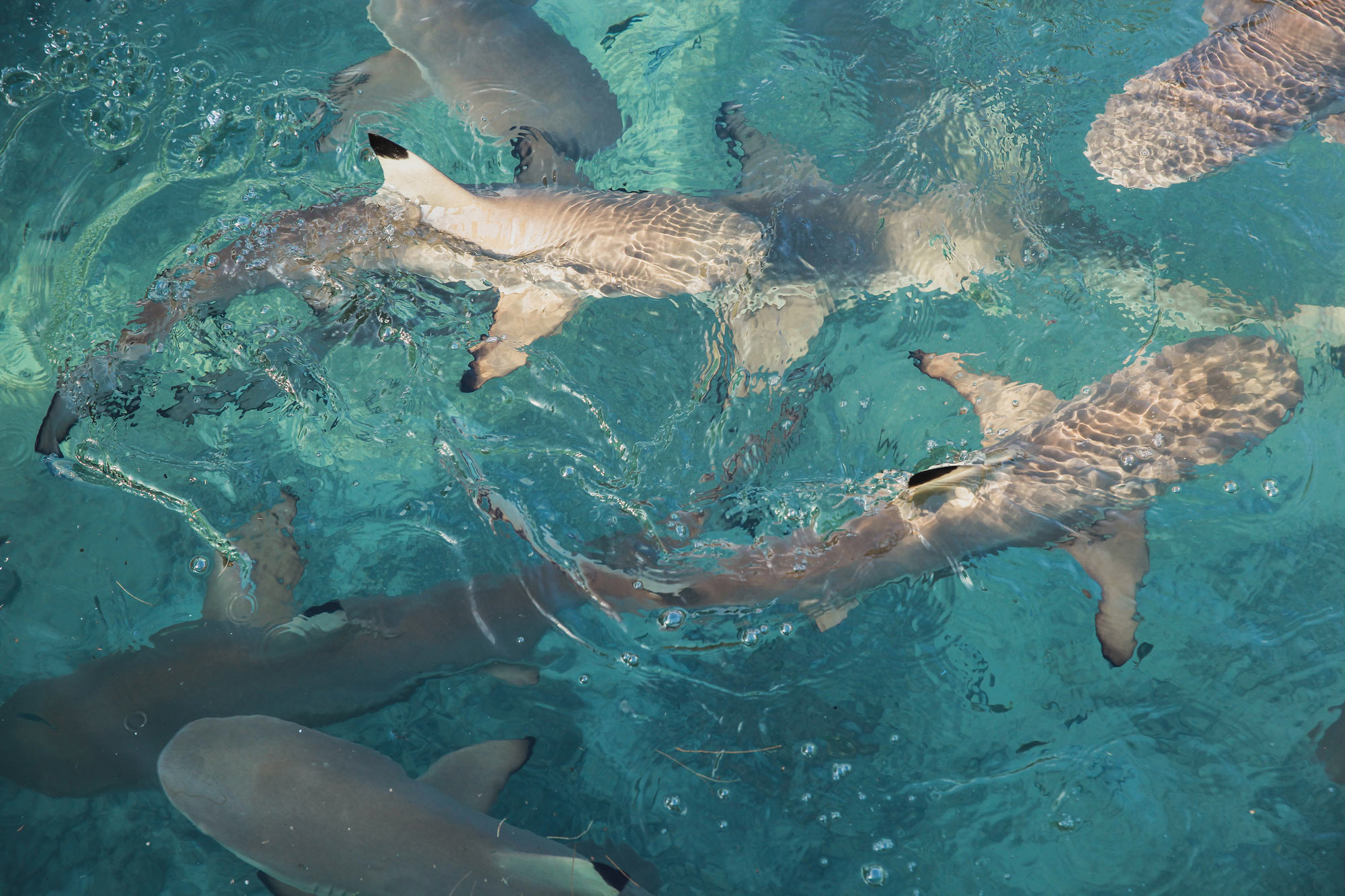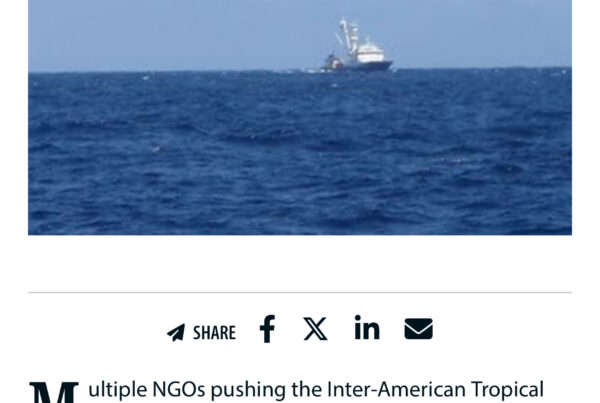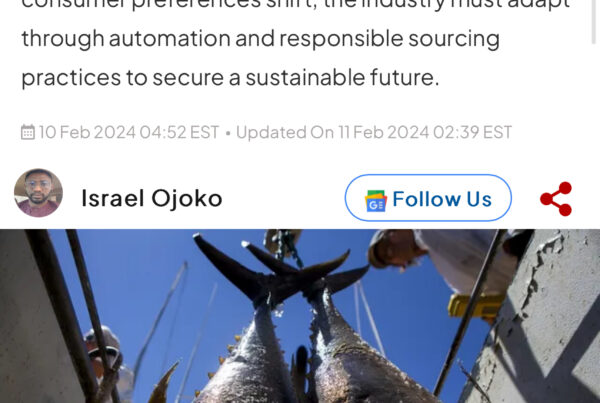IOTC Committee Concerned With Low Levels of Compliance
The Indian Ocean Tuna Commission (IOTC) Compliance Committee has expressed concern with low levels of compliance with the commission’s regulations at its latest meeting.
In response, it has produced several recommendations on how to achieve targets set by IOTC Contracting Parties and Cooperating Non-Contracting Parties (CPCs).
During the 19th session of the committee in May 2022 – and attended by delegates from 25 Contracting Parties and 11 observers and invited experts – the committee observed that within the IOTC, there were low levels of compliance with Resolution 15/02, covering mandatory statistical reporting requirements, and Resolution 17/05, covering the conservation of sharks caught in association with fisheries managed by IOTC. Continue reading here (Source: SeafoodSource).
China’s Security Deal with the Solomons Could Include “Dual-Use” Ports
A reading of some of the headlines on China’s new security deal with Solomon Islands might give the impression that a Chinese naval base with assets pointed straight at Australia is a fait accompli and that other Pacific dominos are just waiting to fall. Public anxiety on the issue has risen sharply—unsurprising given that the deal has been caught up in the dynamics of the federal election campaign—with a recent Sydney Morning Herald survey finding that 70 percent of voters are concerned about it.
The exact terms of the final, signed security agreement haven’t been made public. And Solomon Islands Prime Minister Manasseh Sogavare has assured regional nations including Australia and the US that there will be no Chinese military base in the Solomons and that Australia remains his country’s security partner of choice. Continue reading here(Source: The Maritime Executive).
Tuna Fisheries: IOTC Is In a Dangerous Situation at the Moment, Says Seychelles’ Fisheries Minister
All Indian Ocean Tuna Commission (IOTC) member countries should let science guide decisions and make an effort to follow decisions agreed upon, said Seychelles’ fisheries minister on Monday at the commission’s 26th session.
In his opening address, Jean Francois Ferrari warned that “the credibility of our organisation is at stake” if all member countries do not join together to implement measures that will contribute toward the rebuilding of yellowfin tuna stocks and for proper management of all other stocks and species in the Indian Ocean.
“IOTC is in a dangerous situation at the moment. If as an organisation that has in place measures that need to be applied by member countries and this is not happening, the organisation will collapse,” Ferrari told reporters.Continue reading here (Source: Seychelles News Agency).
Top 10 List of Most-Consumed Seafood Species in US Revealed
Consumption of seafood per capita among American consumers sunk slightly in 2020 compared to 2019, due in large part to the disruptions wrought by the COVID-19 pandemic, according to the National Fisheries Institute’s (NFI) recently-released top 10 list.
The National Oceanic and Atmospheric Administration’s (NOAA) latest Fisheries of the United States report – which NFI uses to compose its routine top species breakdown – found that Americans consumed 19 pounds of seafood per capita in 2020, down from the 19.3-pound average tallied in 2019.
“The onset of COVID-19 brought significant disruption to traditional business operations and consumer behaviors,” NFI said of the findings in a press release. “While restaurants were forced to shutter, there was an impressive uptick in seafood purchases at retail, but apparently not enough to find an equilibrium in the first full year of the pandemic.” Continue reading here (Source: SeafoodSource).
American Tuna Named As One of Whole Foods’ Suppliers of the Year
Whole Foods Market recognized 30 suppliers from the United States, the United Kingdom and Canada for this year’s edition of its annual Supplier Awards.
These recipients were honored in a range of different categories: Regenerative Agriculture Commitment, Service and Partnership, Purpose-Driven Empowerment, Environmental Stewardship, Supply Chain Support, Outstanding Innovation and Raising the Bar for Quality. In addition, regional and overall winners were chosen for the 2021 Rookie of the Year Award and the coveted 2021 Supplier of the Year Award.
Winners were selected by Whole Foods Market leaders, category experts and buyers who work closely with suppliers every day. Continue reading here (Source: New Hope Network).
Mapping The Pacific’s Busiest ‘Blue Corridors’ Could Help Us Save Fish Populations
Large fish in the open sea have declined by at least 90 percent over the past century due to overexploitation.
To pull fish like tuna, swordfish, and marlin back from the brink, scientists argue we need to protect their migration superhighways known as ‘blue corridors’.
A recent study on the Pacific Ocean has mapped the busiest of these underwater traffic lanes using a fish’s tendency to return to its birthplace.
This behavior is known as philopatry, or natal homing, and it’s not just an impulse for salmon.Continue reading here (Source: Science Alert).
Is Tuna A Sustainable Seafood?
World Tuna Day is observed each year on May 2, per National Day Calendar, offering tuna lovers everywhere an opportunity to celebrate this tasty and versatile seafood. Indeed, versatility may be tuna’s greatest asset. It’s wonderful raw as an ingredient in sushi and sashimi, or paired with avocado in ceviche, but it also is enjoyable when forked out of a can. Tuna makes a great sandwich, is delicious in salads, and when served in steak or sesame-crusted medallion form provides a memorable main course.
The myriad ways that tuna can be prepared and its widespread consumption by people who include it as a regular part of their diets raise questions about its longterm sustainability. According to the World Wildlife Fund (WWF), there are five species of tuna that are commonly fished commercially: skipjack, yellowfin, bigeye, albacore, and bluefin. As WWF observes, several members of the tuna family have experienced overfishing in specific ocean habitats. Currently, for example, there are concerns about the overfishing of yellowfin tuna in the Indian Ocean, bigeye in the Atlantic, and Pacific bluefin. Continue reading here (Source: TastingTable).



